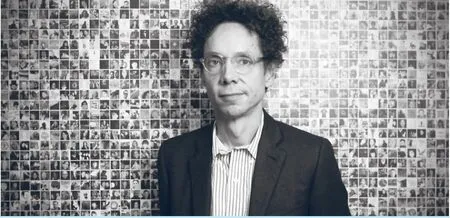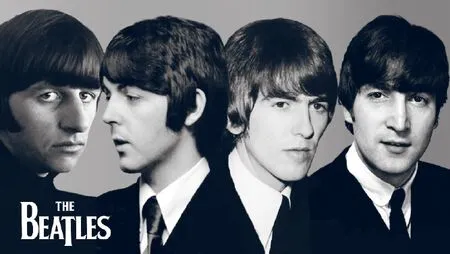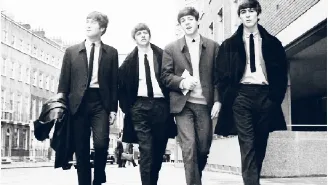Outliers: The Story of Success
2018-09-12翻译苗飞校译思苇
⊙ 翻译:苗飞 校译:思苇
1) outlier [΄aʊtˌlaɪə] n. 异常值,局外人

“成功学”这三个字,天生就有着一种吸引眼球的魅力。
点开任何一个畅销书榜,你总能在上面看到几本成功学的身影;随手打开社交网络,你总能看到各种成功人士在传授经验……看起来红红火火,一派热闹,仿佛谁读完几本书、看过几个视频就能学以致用,点石成金,一举成名——其实大部分作者只会煮一碗让人过目即忘的“毒鸡汤”,能经受住时间考验的寥寥无几,更别说像马尔科姆·格拉德威尔(Malcolm Gladwell)这样被美国高中和大学列为必读作者了。
这位顶着标志性爆炸头的畅销书鬼才1963年生于英格兰,身上流着牙买加的血统,在加拿大长大,现在住在纽约。和一般的成功学作家不同的是,马尔科姆在写作上很有创意,角度刁钻独到,擅长以小见大,通过丰富的案例和曲折的情节逐步阐明自己的观点。他的作品缔造了一个又一个的业界销售神话,而书中提出的各种理论,时至今天依然具有不小的参考意义——比如接下来要谈到的“一万小时法则”。你听说过“一万小时法则”吗?在《异类》出版十周年之际,让我们一起来听听马尔科姆本人给我们讲解这个法则的奇妙之处。
The idea that excellence at a complex task requires a2)critical [΄krɪtɪk(ə)l] adj. 关键的,决定性的critical minimum level of practice3)surface [΄sзːfɪs] v. 浮现,显露surfaces again and again in studies of expertise. In fact, researchers have settled on what they believe is the magic number of true expertise: 10,000 hours.
Is the 10,000-hour rule a general rule of success?
Let’s test the idea with the Beatles, one of the most famous rock bands ever.
The Beatles—John Lennon, Paul McCartney, George Harrison, and Ringo Starr—came to the United States in February of 1964, starting the so-called “British4)invasion [ɪn΄veɪʒ(ə)n] n. 入侵,侵略Invasion”of the American music scene and putting out a string of hit records that transformed the face of popular music.

The first interesting thing about the Beatles, for our purposes, is how long they had already been together by the time they reached the United States. Lennon and McCartney first started playing together in 1957, seven years prior to landing in America. And if you look even more closely at those long years of preparation, you’ll find an experience that,5)in the context of 在……情况下,在……范围内in the context of6)hockey [΄hɒkɪ] n. 冰球,曲棍球hockey players and Bill Joy注1注1:威廉·纳尔逊·乔伊(William Nelson Joy)的通称,美国著名计算机科学家,是太阳微系统公司(Sun Microsystems)的创始人之一。and world-class violinists, sounds7)awfully [΄ɔːfʊlɪ] adv. <口>非常,很,十分awfully familiar. In 1960, while they were still a struggling, high-school rock band, the Beatles were invited to play in Hamburg, Germany.
And what was so special about Hamburg? It wasn’t that it paid well. It didn’t. Or that the8)acoustics [ə΄kuːstɪks] n. 传声效果,音响效果acoustics were fantastic. They weren’t. Or that the audiences were9)savvy [΄sævɪ] adj. 聪明的,懂行的savvy and appreciative.They were anything but. It was the10)sheer [ʃɪə] adj. 纯的,完全的sheer amount of time the band was forced to play.
Here is John Lennon, in an interview after the Beatles11)disband [dɪs΄bænd] v. 解散(团体或组织)disbanded, talk about the band’s performances at a Hamburg club called the Indra:
“We got better and got more confidence. We couldn’t help it,with all the experience playing all night long. It was handy then,being foreign. We had to try even harder, put our heart and soul into it, to get ourselves over. In Liverpool, we’d only ever done one-hour12)session [΄seʃ(ə)n] n. 聚会,集会sessions, and we just used to do our best13)number [΄nʌmbə] n. 调子,乐谱(用复数)numbers,the same ones, at every one. In Hamburg, we had to play for eight hours, so we really had to find a new way of playing.”
Eight hours?
Here is Pete Best, the Beatles’ drummer at the time: “Once the news got out about that we were making a show, the club started packing them in. We played seven nights a week. At first we played almost nonstop until 12:30 in the morning when it closed, but as we got better, the crowds stayed till 2:00 most mornings.”
Seven days a week?
The Beatles ended up traveling to Hamburg five times between 1960 and the end of 1962. On the first trip, they played 106 nights, five or more hours a night. On their second trip, they played 92 times. On their third trip, they played 48 times, for a total of 172 hours on stage. The last two Hamburg14)gig [gɪg] n. <俚>现场演出,特约演奏gigs, in November and December of 1962,involved another 90 hours of performing.15)all told 总共,合计All told, they performed for 270 nights in just over a year and a half. By the time they had their first burst of success in 1964, in fact,they had performed live an16)estimated [΄estɪmteɪd] adj. 估计的,估算的estimated 1,200 times. Do you know how extraordinary that is? Most bands today don’t perform 1,200 times in their entire careers. The Hamburg17)crucible [΄kuːsɪb(ə)l] n. 磨炼,严酷的考验crucible is one of the things that18)set sth. apart 使……显得突出,使……与众不同set the Beatles apart.
“They were no good onstage when they went there, and they were very good when they came back,” Norman注2注2:指菲利普·诺曼(Philip Norman),英国小说家、传记作家、记者及剧作家,因调查并报道甲壳虫乐队解散始末而一举成名。went on. “They learned not only19)stamina [΄stæmɪnə] n. 体力,耐力,持久力stamina. They had to learn an enormous amount of numbers—cover versions of everything that you can think of,not just rock and roll, a bit of jazz too. They weren’t20)disciplined [΄dɪsɪplɪnd] adj. 受过训练的disciplined onstage before that. But when they came back, they sounded like no one else. It was the making of them.”

